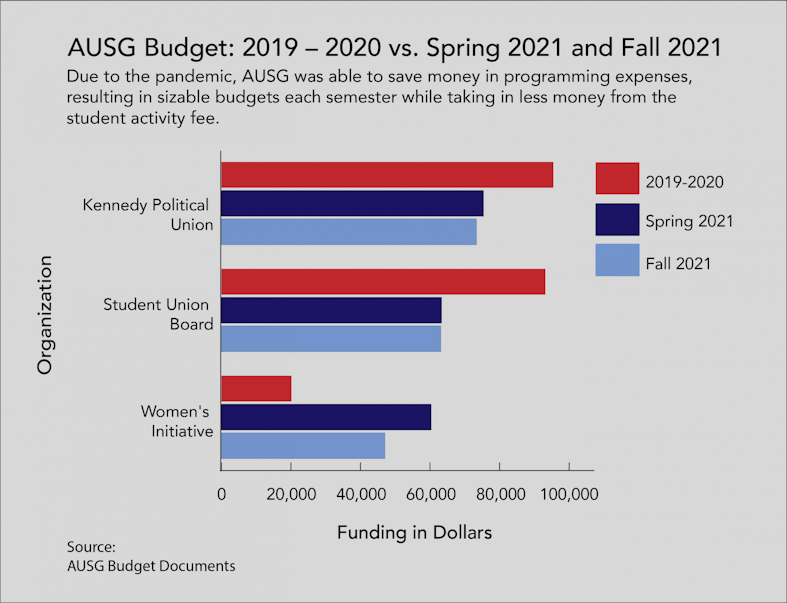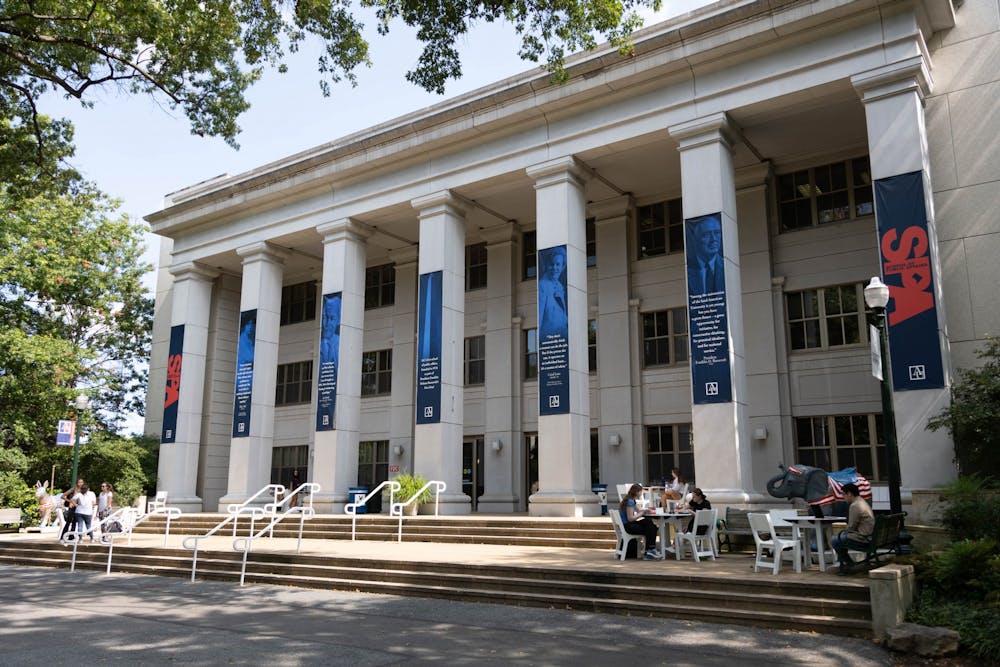From the Newsstands: This story appeared in our December 2021 print edition. You can find the digital version here.
During the fully online semesters of the 2020-2021 school year, the budget allocated to American University Student Government decreased due to cuts to the student activity fee.
The student activity fee, which is the source of SG’s funding, was decreased from $88 to $62 during the 2020-2021 academic year, according to Comptroller Paul Relyea, a junior in the School of Public Affairs.
In turn, the money allocated to organizations like the Kennedy Political Union, Student Union Board, Women’s Initiative, Founders Week and other organizations decreased. KPU received $88,725 per semester during the 2019-2020 school year but $75,000 for the spring 2021 semester, according to SG spending bills. Stipends among members of SG were cut to adjust for the decreased activity fee as well.
“I do understand why that money had to change because we’re just not bringing [in what we used to],” said SG President Chyna Brodie, a junior in the School of Public Affairs and the College of Arts and Sciences. “We’re just not doing events in the same way. So I would just say it’s been an adjustment.”
Prior to the coronavirus pandemic, the SG president received a stipend of $9,000, according to Relyea. Stipends for the SG president and the rest of the executive board for this year are $2,500, according to SG’s 2021-2022 budget breakdown.
Before the virtual semesters, the budget was allocated for the entire year. Now, the budget is calculated each semester because of the recent fluctuations in the student activity fee.
“We moved to a semester basis, which I actually prefer because it provides ... the senate the opportunity to hold people accountable, halfway through the year,” Relyea said.
Despite budget cuts across the board for SG organizations, SG saved $7,483 from the fall semester of 2020, which rolled over to the spring semester.
“People didn’t have to pay for speakers or staging, there were no VIP access or catering events with food,” Relyea said.
The leftover money was then put into SG’s reserves account, Relyea said, and was reallocated to the following semester’s budget.
“From the virtual year my finance committee rolled everything over, so we introduced the [AUSG Reserve Roll-Overs Fall 2021] bill. We rolled everything over that went into reserves for this semester,” Relyea said.
According to Relyea, money from the reserve fund is reallocated fairly based on the percentage of the budget the organization usually gets. However, some organizations saw a higher increase in their budget than others.

Women’s Initiative did not lose as much funding as other organizations in SG. In the 2019-2020 academic year, the Women’s Initiative received $40,000 in funding for the two semesters. That increased to $60,000 in spring 2021 but fell to $46,750 in fall 2021.
The increase in funding over the course of the pandemic can be explained by a few factors, one of which was the expansion of the Women’s Initiative. Founded in the 1960s, the organization has shifted from hosting exclusively community-based events to bringing on more high-profile guests.
“As the years go by, it’s just getting progressively more [high-profile],” said Women’s Initiative Director Kaniya Harris, a sophomore in SPA. “Last year we did have a lot of higher-scale speakers, but we weren’t doing a lot of small-scale events because we were online.”
The Women’s Initiative, like all SG organizations, has also been allowed to roll over leftover money from each semester. This has significantly increased the funding available for the Women’s Initiative at the beginning of each semester, due to the lower costs associated with hosting events and bringing guest speakers to the AU community during the pandemic.
“We’ve just continued that trend to ensure that they are bringing incredible speakers in,” said SG Senator At-Large and Finance Committee Chairman Ryan Hale, a junior in SPA. “That’s one of the best things, I think, that we could have done, increasing their funding.”
Other SG organizations have also benefited from the decreased event costs. In recent years, KPU hosted between five and nine speakers and panels per year, but during the 2020-2021 academic year, it increased that number to 14 guests.
Similarly, SUB typically hosts between three and five performers a year. During the 2020-2021 academic year, however, this number increased to 11 performers.
The directors of the KPU and SUB, Sonali Doshi and Keana Brooks respectively, were unable to be reached for an interview.
Different undergraduate councils are also seeing an increase in funding from leftover money from the online semesters. Each undergraduate council is allotted around five percent of a $3,800 council fund and the councils for the individual schools are allotted around 10.5 percent of the same fund.
“It’s the first time I think in over five years, it might be up to 10 years, that our undergraduate councils got funding, and it’s panning out,” Hale said. “The SIS council account is spending money. The 2024 council is working on spending money, and just providing good programming that otherwise wouldn’t be possible.”
This semester, the student activity fee is still lower than usual, at $75. But with expected increases in the student activity fee to come next semester, SG believes its budget will increase proportionally with the increase in the fee.
With University policy still requiring speakers to be virtual, money is still being saved on travel expenses for high-profile speakers, which will lead to more money being added to the reserves.
“The committee with administration — myself, the president and the senate finance chair — we begin meeting in November, and that’s essentially where that big pool with all the money is broken down,” Relyea said. “So we have a much better idea then, but my anticipation is that it’ll go up, approximately by whatever percentage the student activity fee has gone up.”
jschlanger@theeagleonline.com and aturner@theeagleonline.com





